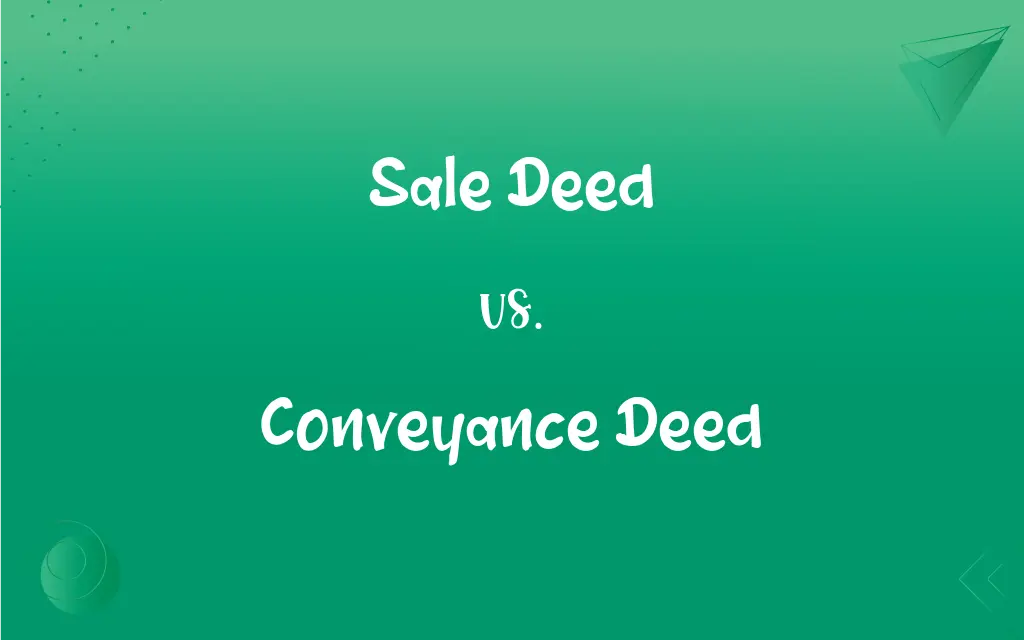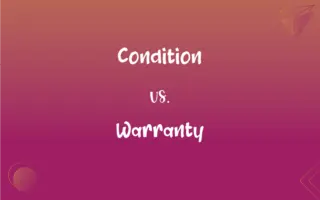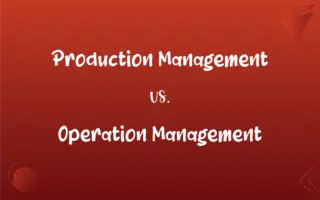Sale Deed vs. Conveyance Deed: What's the Difference?
Edited by Janet White || By Harlon Moss || Updated on October 16, 2023
A sale deed specifically pertains to the sale/purchase of property, while a conveyance deed refers to the transfer of any legal title, rights, or interests in property.

Key Differences
A sale deed is a legal document that proves the sale and transfer of ownership of property from the seller to the buyer. It details the terms and conditions of the sale transaction. Conversely, a conveyance deed is a broader term that includes all types of property transfers, including those achieved through sale, gift, or exchange.
The sale deed is executed at the time of property sale, documenting the transfer of ownership in exchange for a price paid or considered. However, the conveyance deed can refer to any written document that transfers property rights, not necessarily against monetary consideration.
Sale deeds require specific legal formalities: it must be signed, attested, and registered. In comparison, a conveyance deed also needs to comply with similar formalities but applies to various property transfer forms, including gift, lease, mortgage, or exchange.
The sale deed is typically executed after an agreement to sell, confirming the terms and finalizing the transaction. In contrast, a conveyance deed might not follow any prior agreement, especially in non-sale transfers like gifts or inheritances.
A sale deed is mandatory for the sale of immovable property and must be registered under the Registration Act. However, a conveyance deed is a more encompassing term, often used interchangeably with "transfer deed," reflecting any legal means to transfer property, not limited to sales.
ADVERTISEMENT
Comparison Chart
Definition
Specific to property sale/purchase.
Applies to all forms of property transfer.
Monetary Exchange
Involves monetary transaction.
May or may not involve money.
Scope
Narrower, pertaining only to sales.
Broader, includes sales, gifts, exchanges, etc.
Occurrence
Follows an agreement to sell.
Can occur without a prior agreement.
Formalities
Must be signed, attested, and registered.
Similar requirements, but broader applicability.
ADVERTISEMENT
Sale Deed and Conveyance Deed Definitions
Sale Deed
A sale deed is a legal document evidencing the sale and transfer of property ownership.
The buyer secured the property after the completion of the sale deed.
Conveyance Deed
A conveyance deed can reflect various property transfers, including by sale, gift, lease, or inheritance.
In his will, he included a conveyance deed, leaving his estate to his children.
Sale Deed
A sale deed outlines the terms and conditions agreed upon by the buyer and seller during a property transaction.
The sale deed explicitly detailed the payment schedule and property boundaries.
Conveyance Deed
It's a broad term for any written document used to transfer a property's legal title, interest, or rights.
The attorney prepared a conveyance deed to facilitate the property's exchange.
Sale Deed
This deed is a registered document signifying the buyer's legal ownership following a property purchase.
After registering the sale deed, they proudly became the new homeowners.
Conveyance Deed
A conveyance deed is a legal instrument that conveys the transfer of property rights from one party to another.
Through a conveyance deed, the grandmother legally gifted her house to her granddaughter.
Sale Deed
It's a documented contract wherein the seller transfers property rights to the buyer for a specified payment.
They finalized their new home purchase with a binding sale deed.
Conveyance Deed
Conveyance deeds must be registered and comply with legal formalities to effectuate the property transfer.
After notarizing and registering the conveyance deed, the land officially changed hands.
Sale Deed
A sale deed is executed subsequent to an 'agreement to sell' and finalizes the property sale process.
Post their initial agreement, the parties culminated the transaction with a sale deed.
Conveyance Deed
This deed legally ensures the recipient gains all rights, interests, and titles to the property without limitations.
The conveyance deed provided the new owner with full rights to the commercial property.
FAQs
Are sale deed and conveyance deed interchangeable?
No, a sale deed is specific to sales transactions, whereas a conveyance deed is broader, covering all forms of property transfers.
What information does a conveyance deed contain?
A conveyance deed details the property, parties involved, transfer type (e.g., gift, lease), and any monetary consideration if applicable.
What is a sale deed?
A sale deed is a legal document executed during the sale of a property, transferring ownership from the seller to the buyer.
Is registration mandatory for a conveyance deed?
Yes, like sale deeds, conveyance deeds must also be registered to be legally enforceable.
What happens if a sale deed is lost?
If a sale deed is lost, parties should obtain a certified copy from the registrar's office where the deed was recorded.
What constitutes a conveyance deed?
A conveyance deed is any legal document that transfers property rights, encompassing methods like sale, gift, or exchange.
Who prepares the sale deed?
A sale deed is typically prepared by a legal expert or attorney to ensure it meets all legal requirements.
Do both parties need to be present during the sale deed registration?
Yes, both buyer and seller should be present, or their legally authorized representatives must attend the registration.
Who must be present during the registration of a conveyance deed?
Similar to a sale deed, all parties involved in the transfer should be present or send authorized representatives.
Can a sale deed be revoked?
Once executed and registered, a sale deed is permanent unless a court identifies fraud or legal discrepancies.
Is a conveyance deed revocable?
Generally, conveyance deeds are irrevocable unless there are legal grounds such as fraud or mutual agreement for revocation.
What should one do if a conveyance deed is misplaced?
In case of a lost conveyance deed, a duplicate can be requested from the registering authority, provided the loss is well-documented.
Are witnesses important for the execution of a conveyance deed?
Absolutely, witnesses add a layer of legal security by verifying the transaction's authenticity.
What details are specified in a sale deed?
A sale deed includes property details, the agreed price, advance payment received, the balance amount, and the transfer date.
Can a sale deed be executed for a future date?
No, a sale deed records a transaction that has already taken place and is executed concurrently with the transfer.
Does a sale deed require registration?
Yes, a sale deed must be registered to legally validate the transfer of property ownership.
Can a sale deed be executed without an agreement to sell?
Generally, no. A sale deed is usually preceded by an agreement to sell, outlining the terms to be finalized in the deed.
Who is responsible for drafting a conveyance deed?
Conveyance deeds are also drafted by legal professionals, given the need for precise legal language and compliance.
Is a witness necessary for a sale deed execution?
Yes, witnesses are required to attest to the legitimacy of the transaction and the identity of the parties.
Can a conveyance deed specify a future transfer?
Typically, a conveyance deed is executed at the time of transfer, but certain conditions for future transfers can be stipulated.
Does a conveyance deed require a prior agreement?
Not always. Conveyance deeds can be executed without prior agreements, especially in cases of gifts or inheritances.
About Author
Written by
Harlon MossHarlon is a seasoned quality moderator and accomplished content writer for Difference Wiki. An alumnus of the prestigious University of California, he earned his degree in Computer Science. Leveraging his academic background, Harlon brings a meticulous and informed perspective to his work, ensuring content accuracy and excellence.
Edited by
Janet WhiteJanet White has been an esteemed writer and blogger for Difference Wiki. Holding a Master's degree in Science and Medical Journalism from the prestigious Boston University, she has consistently demonstrated her expertise and passion for her field. When she's not immersed in her work, Janet relishes her time exercising, delving into a good book, and cherishing moments with friends and family.
































































